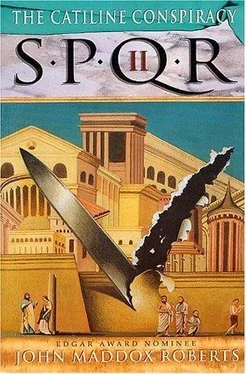John Roberts - The Catiline Conspiracy
Здесь есть возможность читать онлайн «John Roberts - The Catiline Conspiracy» весь текст электронной книги совершенно бесплатно (целиком полную версию без сокращений). В некоторых случаях можно слушать аудио, скачать через торрент в формате fb2 и присутствует краткое содержание. Жанр: Исторический детектив, на английском языке. Описание произведения, (предисловие) а так же отзывы посетителей доступны на портале библиотеки ЛибКат.
- Название:The Catiline Conspiracy
- Автор:
- Жанр:
- Год:неизвестен
- ISBN:нет данных
- Рейтинг книги:3 / 5. Голосов: 1
-
Избранное:Добавить в избранное
- Отзывы:
-
Ваша оценка:
- 60
- 1
- 2
- 3
- 4
- 5
The Catiline Conspiracy: краткое содержание, описание и аннотация
Предлагаем к чтению аннотацию, описание, краткое содержание или предисловие (зависит от того, что написал сам автор книги «The Catiline Conspiracy»). Если вы не нашли необходимую информацию о книге — напишите в комментариях, мы постараемся отыскать её.
The Catiline Conspiracy — читать онлайн бесплатно полную книгу (весь текст) целиком
Ниже представлен текст книги, разбитый по страницам. Система сохранения места последней прочитанной страницы, позволяет с удобством читать онлайн бесплатно книгу «The Catiline Conspiracy», без необходимости каждый раз заново искать на чём Вы остановились. Поставьте закладку, и сможете в любой момент перейти на страницу, на которой закончили чтение.
Интервал:
Закладка:
Salii: "Dancers." Two colleges of priests dedicated to Mars and Quirinus who held their rites in March and October, respectively. Each college consisted of twelve young patricians whose parents were still living. On their festivals, they dressed in embroidered tunics, a crested bronze helmet and breastplate and each bore one of the twelve sacred shields ("ancilia") and a staff. They processed to the most important altars of Rome and before each performed a war dance. The ritual was so ancient that, by the first century B.C., their songs and prayers were unintelligible.
Saturnalia: Feast of Saturn, December 17-23, a raucous and jubilant occasion when gifts were exchanged, debts were settled and masters waited on their slaves.
Sella Curulis: A folding camp-chair. It was part of the insignia of the curule magistrates and the Flamen Dialis.
Senate: Rome's chief deliberative body. It consisted of three hundred to six hundred men, all of whom had won elective office at least once. Once the supreme ruling body, by the late Republic the Senate's former legislative and judicial functions had devolved upon the courts and the popular assemblies and its chief authority lay in foreign policy and the nomination of generals. Senators were privileged to wear the tunica laticlava.
Servile War: The slave rebellion led by the Thracian gladiator Spartacus in 73-71 B.C. The rebellion was crushed by Crassus and Pompey.
Sica: A single-edged dagger or short sword of varying size. It was favored by thugs and used by the Thracian gladiators in the arena. It was classified as an infamous rather than an honorable weapon.
Solarium: A rooftop garden and patio.
Spatha: The Roman cavalry sword, longer and narrower than the gladius.
SPQR: "Senatus populusque Romanus." The Senate and People of Rome. The formula embodying the sovereignty of Rome. It was used on official correspondence, documents and public works.
Stirps: A sub-family of a gens. The cognomen gave the name of the stirps, i.e., Caius Julius Caesar: Caius of the stirps Caesar of gens Julii.
Strigil: A bronze implement, roughly s-curved, used to scrape sand and oil from the body after bathing. Soap was unknown to the Roman Republic.
Strophium: A cloth band worn by women beneath or over the clothing to support the breasts.
Subligaculum: A loincloth, worn by men and women.
Subura: A neighborhood on the lower slopes of the Viminal and Esquiline, famed for its slums, noisy shops and raucous inhabitants.
Tarpeian Rock: A cliff beneath the Capitol from which traitors were hurled. It was named for the Roman maiden Tarpeia who, according to legend, betrayed the Capitol to the Sabines.
Temple of Jupiter Capitolinus: The most important temple of the state religion. Triumphal processions ended with a sacrifice at this temple.
Temple of Saturn: The state treasury was located in a crypt beneath this temple. It was also the repository for military standards.
Temple of Vesta: Site of the sacred fire tended by the vestal virgins and dedicated to the goddess of the hearth. Documents, especially wills, were deposited there for safekeeping.
Toga: The outer robe of the Roman citizen. It was white for the upper classes, darker for the poor and for people in mourning. The toga praetexta, bordered with a purple stripe, was worn by curule magistrates, by state priests when performing their functions and by boys prior to manhood. The toga picta, purple and embroidered with golden stars, was worn by a general when celebrating a triumph, also by a magistrate when giving public Games.
Tonsores: A slave trained as a barber and hairdresser.
Trans-Tiber: A newer district on the right or western bank of the Tiber. It lay beyond the old city walls.
Tribal Assemblies: There were two: the comitia tributa, an assembly of all citizens by tribes, which elected the lower magistrates-curule aediles, and quaestors, also the military tribunes-and the concilium plebis, consisting only of plebeians, elected the tribunes of the plebs and the plebeian aediles.
Tribe: Originally, the three classes of patricians. Under the Republic, all citizens belonged to tribes of which there were four city tribes and thirty-one country tribes. New citizens were enrolled in an existing tribe.
Tribune: Representative of the plebeians with power to introduce laws and to veto actions of the Senate. Only plebeians could hold the office, which carried no imperium. Military tribunes were elected from among the young men of senatorial or equestrian rank to be assistants to generals. Usually it was the first step of a man's political career.
Triumph: A magnificent ceremony celebrating military victory. The honor could be granted only by the Senate and until he received permission, the victorious general had to remain outside the city walls, as his command ceased the instant he crossed the pomerium. The general, called the triumphator, received royal, near-divine honors and became a virtual god for a day. A slave was appointed to stand behind him and remind him periodically of his mortality lest the gods become jealous.
Triumvir: A member of a triumvirate-a board or college of three men. Most famously, the three-man rule of Caesar, Pompey and Crassus. Later, the triumvirate of Antonius, Octavian and Lepidus.
Tunica: A long, loose shirt, sleeveless or short-sleeved, worn by citizens beneath the toga when outdoors and by itself indoors. The tunica laticlava had a broad purple stripe from neck to hem and was worn by Senators and patricians. The tunica angusticlava had a narrow stripe and was worn by the equites. The tunica picta, purple and embroidered with golden palm branches, was worn by a general when he celebrated a triumph.
Usus: The most common form of marriage, in which a man and woman lived together for a year without being separated for three consecutive nights.
Via: A highway. Within the city, viae were streets wide enough for two wagons to pass one another. There were only two viae during the Republic: the Via Sacra, which ran through the Forum and was used for religious processions and triumphs, and the Via Nova, which ran along one side of the Forum.
Vigile: A night watchman. The vigiles had the duty of apprehending felons caught committing crimes, but their main duty was as a fire watch. They were unarmed except for staves and carried fire-buckets.
Интервал:
Закладка:
Похожие книги на «The Catiline Conspiracy»
Представляем Вашему вниманию похожие книги на «The Catiline Conspiracy» списком для выбора. Мы отобрали схожую по названию и смыслу литературу в надежде предоставить читателям больше вариантов отыскать новые, интересные, ещё непрочитанные произведения.
Обсуждение, отзывы о книге «The Catiline Conspiracy» и просто собственные мнения читателей. Оставьте ваши комментарии, напишите, что Вы думаете о произведении, его смысле или главных героях. Укажите что конкретно понравилось, а что нет, и почему Вы так считаете.










